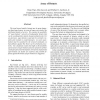Free Online Productivity Tools
i2Speak
i2Symbol
i2OCR
iTex2Img
iWeb2Print
iWeb2Shot
i2Type
iPdf2Split
iPdf2Merge
i2Bopomofo
i2Arabic
i2Style
i2Image
i2PDF
iLatex2Rtf
Sci2ools
105
click to vote
NDSS
2007
IEEE
2007
IEEE
Army of Botnets
The trend toward smaller botnets may be more dangerous than large botnets, in terms of large-scale attacks like distributed denials of service. We examine the possibility of “super-botnets,” networks of independent botnets that can be coordinated for attacks of unprecedented scale. For an adversary, super-botnets would also be extremely versatile and resistant to countermeasures. As such, superbotnets must be examined by the research community, so that defenses against this threat can be developed proactively. Our simulation results shed light on the feasibility and structure of super-botnets and some properties of their command-and-control mechanism. New forms of attack that super-botnets can launch are explored, and possible defenses against the threat of super-botnets are suggested.
| Added | 04 Jun 2010 |
| Updated | 04 Jun 2010 |
| Type | Conference |
| Year | 2007 |
| Where | NDSS |
| Authors | Ryan Vogt, John Aycock, Michael J. Jacobson Jr. |
Comments (0)

